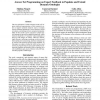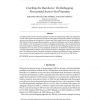70 search results - page 4 / 14 » Inferring acceptable arguments with Answer Set Programming |
129
Voted
FLAIRS
2008
15 years 4 months ago
2008
The next generation of online reference works will require structured representations of their contents in order to support scholarly functions such as semantic search, automated ...
117
click to vote
CORR
2010
Springer
15 years 2 months ago
2010
Springer
An important issue towards a broader acceptance of answer-set programming (ASP) is the deployment of tools which support the programmer during the coding phase. In particular, met...
200
Voted
ICAIL
2011
ACM
14 years 2 months ago
2011
ACM
A formal two-phase model of democratic policy deliberation is presented, in which in the first phase sufficient and necessary criteria for proposals to be accepted are determine...
212
click to vote
ASP
2005
Springer
15 years 8 months ago
2005
Springer
Preferences are useful when the space of feasible solutions of a given problem is dense but not all these solutions are equivalent w.r.t. some additional requirements. In this case...
119
click to vote
JAIR
2008
15 years 2 months ago
2008
The notion of strong equivalence on logic programs with answer set semantics gives rise to a consequence relation on logic program rules, called SE-consequence. We present a sound...


